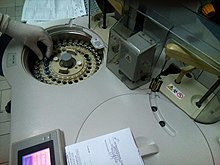Clinical chemistry
This article relies largely or entirely on a single source. (September 2020) |

Clinical chemistry (also known as chemical pathology, clinical biochemistry or medical biochemistry) is a division in medical laboratory sciences focusing on qualitative tests of important compounds, referred to as analytes or markers, in bodily fluids and tissues using analytical techniques and specialized instruments.[1] This interdisciplinary field includes knowledge from medicine, biology, chemistry, biomedical engineering, informatics, and an applied form of biochemistry (not to be confused with medicinal chemistry, which involves basic research for drug development).[citation needed]
The discipline originated in the late 19th century with the use of simple
Blood and urine are the most common test specimens clinical chemists or medical laboratory scientists collect for clinical routine tests, with a main focus on
Common Analytes
Some common analytes that clinical chemistry tests analyze include:
- Electrolytes
- Renal (kidney) function tests
- Liver function tests
- Total protein (serum)
- Albumin
- Globulins
- A/G ratio (albumin-globulin)
- Protein electrophoresis
- Urine protein
- Bilirubin; direct; indirect; total
- Aspartate transaminase (AST)
- Alanine transaminase (ALT)
- Gamma-glutamyl transpeptidase(GGT)
- Alkaline phosphatase (ALP)
- Cardiac markers
- Minerals
- Blood disorders
- Iron
- Transferrin
- TIBC
- Vitamin B12
- Vitamin D
- Folic acid
- Miscellaneous
- Glucose
- C-reactive protein
- Glycated hemoglobin (HbA1c)
- Uric acid
- Arterial blood gases([H+], PCO2, PO2)
- Adrenocorticotropic hormone (ACTH)
- Toxicological screening and forensic toxicology (drugs and toxins)
- Neuron-specific enolase (NSE)
- fecal occult blood test (FOBT)
Panel tests
A physician may order many laboratory tests on one specimen, referred to as a test panel, when a single test cannot provide sufficient information to make a swift and accurate diagnosis and treatment plan. A test panel is a group of many tests a clinical chemists do on one sample to look for changes in many analytes that may be indicative of specific medical concerns or the health status of an organ system.[5] Thus, panel tests provide a more extensive evaluation of a patient's health, have higher predictive values for confirming or disproving a disease, and are quick and cost-effective.
Metabolic Panel
A
Basic Metabolic Panel
BMP is a panel of tests that measures eight analytes in the blood's fluid portion (plasma). The results of the BMP provide valuable information about a patient's kidney function, blood sugar level, electrolyte levels, and the acid-base balance. Abnormal changes in one or more of these analytes can be a sign of serious health issues:
- Sodium, Potassium, Chloride, and Carbon Dioxide: they are electrolytes that have electrical charges that manage the body’s water level, acid-base balance in the blood, and kidney function.[7]
- Calcium: This charged electrolyte is essential for the proper functions of nerve, muscle, blood clotting, and bone health. Changes in the calcium level can be signs of bone disease, muscle cramps/ spasms, thyroid disease, or other conditions.[8]
- blood sugar levels, which is a crucial energy for your body and brain. High glucose levels can be a sign of diabetes or insulin resistance. [7]
- Urea and Creatinine: These are waste products that the kidney filters out from blood. Urea measurements are helpful in detecting and treating kidney failure and related metabolic disorders, whereas creatinine measurements give information on kidney’s health, tracking renal dialysis treatment, and monitor hospitalized patients that are on diuretics.[7]
Comprehensive Metabolic Panel
Specimen Processing
For blood tests, clinical chemists must process the specimen to obtain plasma and serum before testing for targeted analytes. This is most easily done by
Instruments
Most current medical laboratories now have highly automated analyzers to accommodate the high workload typical of a hospital laboratory, and accept samples for up to about 700 different kinds of tests.[9] Even the largest of laboratories rarely do all these tests themselves, and some must be referred to other labs. Tests performed are closely monitored and quality controlled.
Specialties
The large array of tests can be categorised into sub-specialities of:
- General or routine chemistry – commonly ordered blood chemistries (e.g., liver and kidney function tests).
- Special chemistry – elaborate techniques such as electrophoresis, and manual testing methods.
- Clinical endocrinology – the study of hormones, and diagnosis of endocrine disorders.
- drugs of abuseand other chemicals.
- Therapeutic Drug Monitoring – measurement of therapeutic medication levels to optimize dosage.
- Urinalysis – chemical analysis of urine for a wide array of diseases, along with other fluids such as CSF and effusions
- Fecal analysis – mostly for detection of gastrointestinal disorders.
See also
- Reference ranges for common blood tests
- Medical technologist
- Clinical Biochemistry (journal)
Notes and references
- ISBN 9781284510140.
- ISBN 978-1-4557-4165-6.
- ^ Science, Mayo Clinic College of Medicine and. "Medical Laboratory Scientist - Explore Health Care Careers - Mayo Clinic College of Medicine & Science". Mayo Clinic College of Medicine and Science. Retrieved 2023-04-02.
- ^ Abisti, Gerard Evans. "Chemical Pathology". The Association of Clinical Pathologists. Retrieved 2023-03-31.
- ^ thrive (2020-05-10). "Benefits of Lab Test Panels (Bundled Tests)". Test Smartly Labs. Retrieved 2023-04-15.
- ^ "Basic Metabolic Panel (Blood) - Health Encyclopedia - University of Rochester Medical Center". www.urmc.rochester.edu. Retrieved 2023-04-15.
- ^ ISBN 978-1-97-510558-7.
- ^ MedlinePlus [Internet]. Bethesda (MD): National Library of Medicine (US); Calcium Blood Test; [updated 2022 Jun 02; cited 2023 April 05]; [about 3 screens]. Available from: https://medlineplus.gov/lab-tests/calcium-blood-test/
- PMID 25336760.
Bibliography
Burtis, Carl A.; Ashwood, Edward R.; Bruns, David E. (2006). Tietz textbook of clinical chemistry (4th ed.). Saunders. p. 2448.
